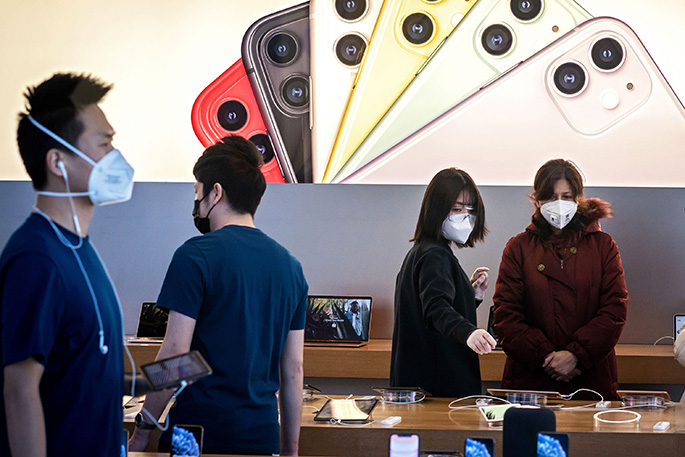COVID-19: Significant disruption for tech firms as China re-opens

The announcement that China would reopen its factories by the end of March helped lessen the pressure experienced by several technology companies across the world since the coronavirus outbreak began. However, the disruptions in the supply chain are far from getting back to normal.
A survey conducted by the Institute for Supply Management, a US trade association, revealed that 80% of the 600 US companies would be affected by the disruptions in early March. However, the number rose to 95% by the end of March as others anticipated the severity to heighten in other parts of the world such as in Japan, Europe, North America, and Korea after the reopening of China.
According to Kamala Raman, a senior director of supply chain at the research and advisory firm Gartner, China is currently not the most significant challenge as the world is in a worse position due to the spread of the virus.
Although China has increased its manufacturing capacity, tech companies were significantly affected by the challenges in supply-chain as the virus continues spreading across the world. The virus has averaged various countries 45 times more people than China, the global epicenter. Countries have implemented stay-at-home orders and closed factories leading to a significant worker shortage and disruptions of transportation, which further worsens the disruptions in the supply-chain network.
As stated by Seabury Consulting, global air cargo capacity reduced by 35% year-on-year in the first week of April. The most affected routes were Europe to North America routes with a drop of 60%. Air cargo from China to North America fell by 15%.
The rush to obtain personal protective equipment to help protect healthcare workers increased shipping demand making air cargo rates increase more than ten times. According to the World Bank, air freight base rates often start at US$1.50 per kilogram or 68 cents per pound. According to the UPS website, the current lowest freight rate is at US$7.38 per kilogram.
Tech companies in the US are often greatly affected by disruptions in the supply chain, as hundreds of parts used to manufacture or produce a single product come from multiple countries. These parts also involve several manufacturing steps that are accomplished by overseas companies.
According to Kaj Malden, a policy analyst at the US-China Economic and Security Review Commission reported that thin supply inventories pose a challenge to the computer and electronic product industry.
For instance, parts of the iPhone, such as chips, cameras, batteries, and accessories, are manufactured by different companies across the world.
Qualcomm is a US company that supplies iPhone cameras and chips and makes its parts in Indonesia, South Korea, Brazil, India, Australia, China, and other countries in Latin America and Europe.
As stated by Raman, the surging effect is that companies may need several parts to build a product but are unable to do so because of the lack of some parts.
The impact of the disruption was first experienced by the tech companies immediately COVID-19 started spreading across China, resulting in all cities to be in lockdown and manufacturing plants shut. Qualcomm made a statement saying that complying with the Chinese government restrictions reduced the ability of the employees to work. However, although the restrictions were lessened on March 12, 2020, the company announced mandatory work from home policy for their employees across the world for those who can perform their jobs remotely. The company expects the supply and workforce challenge to continue and probably increase in specific cases.
The major setback that the product delay has caused is that the awaited March release of the new iPhone had to be postponed due to the pause of the manufacturing process in China and, consequently, the disruption of supply chains beyond China. Therefore, the 5G iPhone will not be released due to the global lockdown, and as the supply chain in Asia returns to normalcy. There is an expectation that the iPhone 12 will be launched after October 2020.
Intel, a major producer of the silicon chip, also pointed out the impact of disruption caused by shutdown outside China. Intel, based in Santa Clara, California, pointed out that its operations in various countries, including the US, Malaysia, Ireland, and Vietnam, have been significantly influenced by the outbreak.
Intel joined several companies at an investor call late last month to withdraw full-year guidance about their prospects amid the uncertainties caused by the pandemic. Shutdowns in various countries of operation have resulted in Intel stalling construction projects. Besides, Intel employees in Oregon, California, and Arizona have tested positive for COVID-19.
As stated by Intel, transportation restrictions, and disruptions such as port closures, stringent border controls, and limited air transport has affected the company’s ability to meet consumer demand.
As a result, tech companies are considering whether to depend on other countries for the parts needed in product manufacturing.
At an event sponsored by Foreign Policy last week, Shannon O’Neil, a senior fellow at the Council of Foreign Relations, stated that the global supply chain has resulted in significant benefits to economies and is why luxuries are available at the cost of a couple of hundred dollars. A pullback will result in a significant loss to everyone making economies poorer and less prosperous.
Despite this, businesses, especially tech companies, are reminded that even with the vulnerability, reliance comes handy. Several regions, including those that were severely affected, are reopening. By Friday, most of the states in the US had loosened the restrictions or were planning to loosen the restriction. However, leading health experts are advising that COVID-19 can return in the fall, becoming a seasonal disease like the flu.
According to John Scannapieco, chair of the global business practice at the Baker Donelson law firm, if the pandemic becomes part of our daily life, then the challenges in the supply chain will continue, and companies will experience several disruptions.
Source